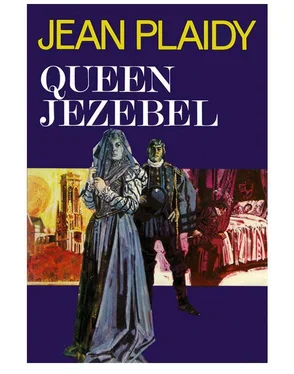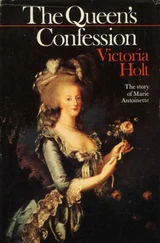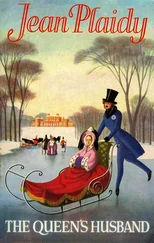Виктория Холт - Queen Jezebel
Здесь есть возможность читать онлайн «Виктория Холт - Queen Jezebel» весь текст электронной книги совершенно бесплатно (целиком полную версию без сокращений). В некоторых случаях можно слушать аудио, скачать через торрент в формате fb2 и присутствует краткое содержание. Жанр: Исторические любовные романы, на английском языке. Описание произведения, (предисловие) а так же отзывы посетителей доступны на портале библиотеки ЛибКат.
- Название:Queen Jezebel
- Автор:
- Жанр:
- Год:неизвестен
- ISBN:нет данных
- Рейтинг книги:4 / 5. Голосов: 1
-
Избранное:Добавить в избранное
- Отзывы:
-
Ваша оценка:
- 80
- 1
- 2
- 3
- 4
- 5
Queen Jezebel: краткое содержание, описание и аннотация
Предлагаем к чтению аннотацию, описание, краткое содержание или предисловие (зависит от того, что написал сам автор книги «Queen Jezebel»). Если вы не нашли необходимую информацию о книге — напишите в комментариях, мы постараемся отыскать её.
Queen Jezebel — читать онлайн бесплатно полную книгу (весь текст) целиком
Ниже представлен текст книги, разбитый по страницам. Система сохранения места последней прочитанной страницы, позволяет с удобством читать онлайн бесплатно книгу «Queen Jezebel», без необходимости каждый раз заново искать на чём Вы остановились. Поставьте закладку, и сможете в любой момент перейти на страницу, на которой закончили чтение.
Интервал:
Закладка:
‘On my part,’ she told him, It would merely be because we are a King and Queen and etiquette makes its demands upon us.’
‘And for mine,’ he replied, ‘it would be because I find it so ungallant to be in bed with a lady and resist . . . the demands of gallantry, you understand?’
She moved away, but he had caught her.
He whispered: ‘The gallantry of Béam and the etiquette of France . . . together, my love, they are irresistible.’
Two
IN THE LOUVRE THE BALLETS AND MASQUEScontinued. Outside the common people gathered in groups. They looked up at the lighted windows and said: ‘What does it mean? Huguenots and Catholics dance together; they join hands; they sing; they watch the same tourneys, the same nymphs and shepherds. They are joined in amity . . . and yet, what does it mean?’
The days were hot; there was not a breath of wind. When it was dark the stars seemed big in the sky; and all through the night the sounds of revelry could be heard throughout the city. People danced in the streets and when they were exhausted lay on the cobbles, since Paris could not provide beds for so many visitors. It was all gaiety and celebration and yet there was hardly a person in the city who did not feel that there was something false, a little unreal, about these wedding festivities.
Least concerned of any was perhaps the bride. She danced wildly; she seemed more fascinating than ever, more alluring; the reluctant bride enjoying her role, too absorbed in her own affairs to think of anything that might be happening about her.
She was the most enchanting figure in that ballet which Henry of Guise with his two brothers and sisters had devised for the entertainment of the court., ‘The Mystery of the Three Worlds’ they called it, and it was a brilliant charade into which they had infused a certain mockery, a certain defiance of their enemies. Henry of Navarre and that other Henry, the Prince of Condé, had been dressed as knights and had been shown as entering Paradise, where they found among others such beauteous nymphs as Marguerite, the bride, and Charlotte de Sauves. They danced together rapturously to the applause of the onlookers; but it seemed that this was not the end of the ballet, for quite unexpectedly the King and his brother Anjou appeared, more richly dressed than Navarre and Condé, and there was a mock battle between the four knights which Navarre and Condé realized they must lose, for none—even in play—must overcome the King of France. And so Navarre and Condé were driven from the women; and there appeared numbers of courtiers dressed as devils who made sport with Navarre and Condé and drove them into the company of more courtiers in similar dress; curtains were parted to show a great fire, and it was understood immediately that the Huguenot Princes had been driven to Hell.
The Catholics cheered wildly as the King and Anjou danced with the ladies while the ‘devils’ pranced wildly about the bewildered Navarre and Condé, prodding them towards the fire.
The Huguenots watched in silence and with apprehension. Only the King of Navarre seemed to be enjoying himself, having a riotous time in Hell, trying to fight his way back to Paradise and almost succeeding in wresting Madame de Sauves from Anjou and carrying her to Hell with him.
Afterwards, dancing with Henry of Guise, Margot said to him: ‘You spoil the fun with such masques as that.’
‘Nay,’ said Guise. ‘All enjoyed it.’
‘The Catholics jeered,’ said Margot, ‘but the Huguenots were uneasy:
‘Then perhaps they will change their ways before they are driven to Hell in very truth.’
‘I wish that you were less of a fanatic. Fanaticism is folly.’ He looked at her sharply. ‘Who has been counselling you?’
‘No one. To whose counsel do you think I would listen? I am sickened by this strife between Huguenots and Catholics.’
‘Not long ago you were a firm Catholic. Has this marriage of yours anything to do with the change?’
‘I am still a firm Catholic, and my marriage has not changed me in the least.’
‘Are you sure of that? It seems to me that you do not view your husband with the same disfavour.’
‘What is the use now that I am married to him? You are jealous?’
‘Maddeningly. What do you imagine my feelings have been these last days and nights?’
‘Ah!’ sighed Margot. ‘It was when I looked at you that I could not make the responses.’
‘I know.’
‘Henry, do something for me.’
‘Anything in the world.’
‘Then stop this baiting of Huguenots. Let us be peaceful for a change. That stupid masque of the Three Worlds, and that one in which you made my husband and Condé Turks and my brothers Amazons to beat them in battle . . . in such you go too far. All remembered how the Turks were beaten at Lepanto, and they knew what insults you intended to convey. It is tasteless and inelegant.’
‘Marriage has made you tender to these Huguenots.’
‘Huguenots! Catholics! Let us think of something else. But you cannot, can you? Even now when you talk to me, talk of love, your thoughts are elsewhere. Do I not know it? What are you thinking of? What are you hatching?’
She had moved closer to him and as she looked up into his brilliant eyes, just for a second she saw distrust in them. They had been passionate lovers; but although he desired her as she desired him, he would not trust her with his secrets, for now she was the wife of a Huguenot, and nothing—desire, passion, love—could make him forget that the Huguenots were his bitterest enemies.
‘I am thinking of you,’ he said.
She laughed, a trifle scornfully. Still, he was very handsome and to be near him was to realize afresh his charms; his vitality matched that of her husband, but how different he was. He was beautiful, elegant; he moved with grace; his manners were perfect; he was skilled in chivalry. How could she compare such a man with her coarse provincial husband, quick-witted and amusing though he might be? Henry of Guise and Henry of Navarre! As well compare an eagle with a crow, a swan with a duck. Henry of Guise was serious; Henry of Navarre careless. Henry of Guise looked for greatness and honour; Henry of Navarre for women to give him pleasure. I cannot be blamed for loving Henry of Guise, thought Margot.
‘I must see you alone,’ she said.
‘Why yes,’ he answered, but his eyes had strayed beyond her, and she noticed that they had settled on someone in the crowd about the door of the hall. Angry jealousy beset her; but it was quickly turned into curiosity, for it was not a woman at whom he looked but a man whom she recognized as one of his old tutors, the Chanoine de Villemur.
The Chanoine’s eyes met those of Guise, and the two men exchanged glances which seemed to Margot full of meaning. ‘Well,’ she demanded, ‘when?’
‘Margot,’ he said, ‘I will see you later. I must have a word with the old man over there. Later, my darling . .
She stood angrily watching him as he went across the hall. She saw him pause and mutter something to the old man before the two of them were lost in the crowd; but a few seconds later she saw the old man alone, saw him hesitate for a while and then slip quietly out of the hall; but although she looked for Henry of Guise she could not see him.
How dared he! He had made an excuse to leave her. Doubtless he had some assignation with a woman. That she would not endure. She looked about her and was faintly relieved to see Charlotte de Sauves chatting animatedly with Henry of Navarre.
When Henry of Guise left the Louvre he went hurriedly to the house of the Chanoine de Villemur, which was situated nearby in a narrow street leading to the Rue Béthisy, where Coligny had his house.
Читать дальшеИнтервал:
Закладка:
Похожие книги на «Queen Jezebel»
Представляем Вашему вниманию похожие книги на «Queen Jezebel» списком для выбора. Мы отобрали схожую по названию и смыслу литературу в надежде предоставить читателям больше вариантов отыскать новые, интересные, ещё непрочитанные произведения.
Обсуждение, отзывы о книге «Queen Jezebel» и просто собственные мнения читателей. Оставьте ваши комментарии, напишите, что Вы думаете о произведении, его смысле или главных героях. Укажите что конкретно понравилось, а что нет, и почему Вы так считаете.












